Script by Rajorshi Das
Illustrations by Micki Burdick
For the full script in PDF form click here.
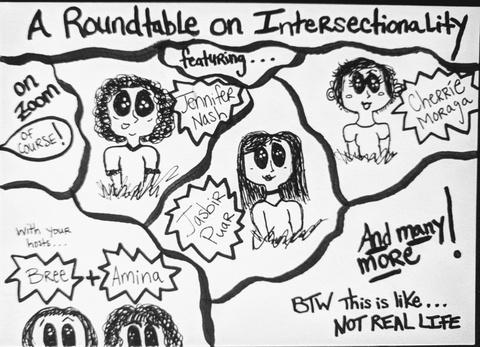
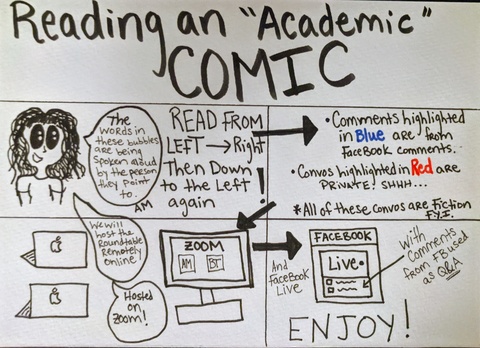
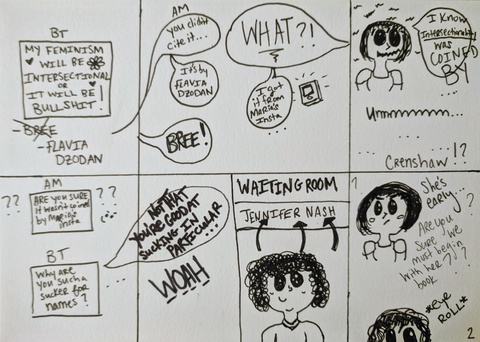
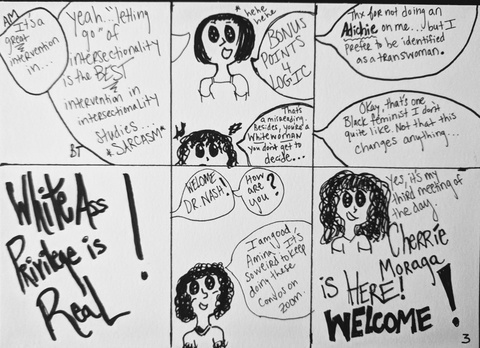
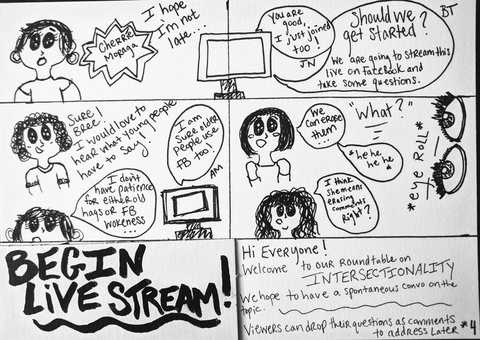
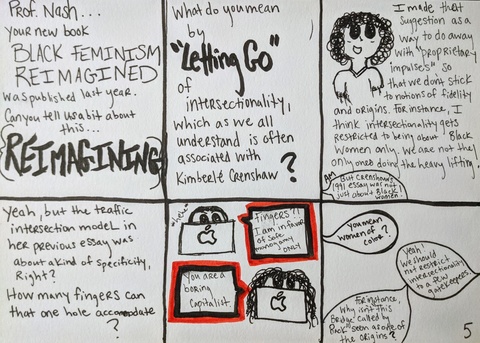
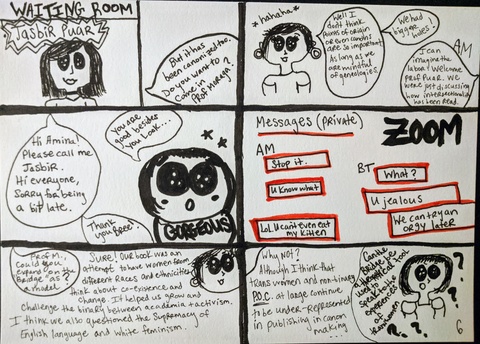
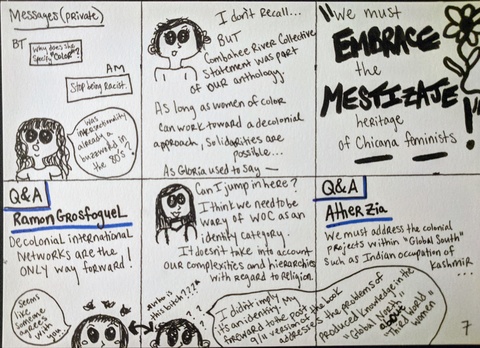
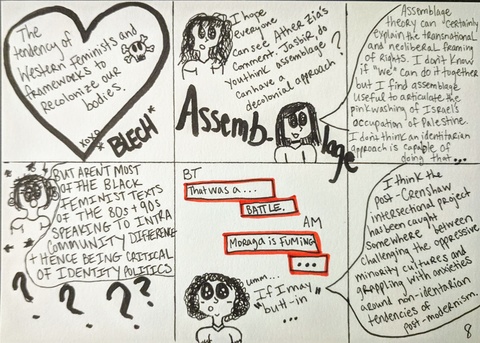
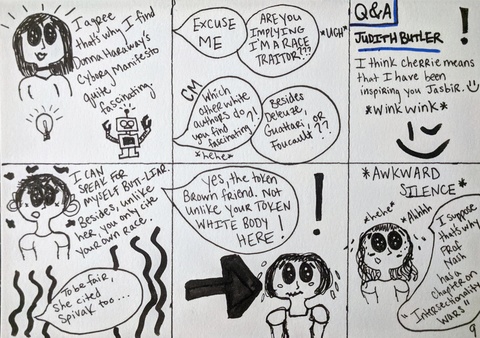
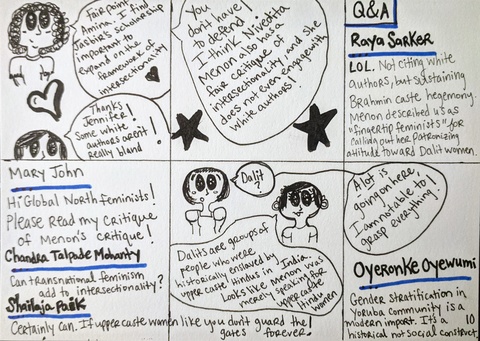
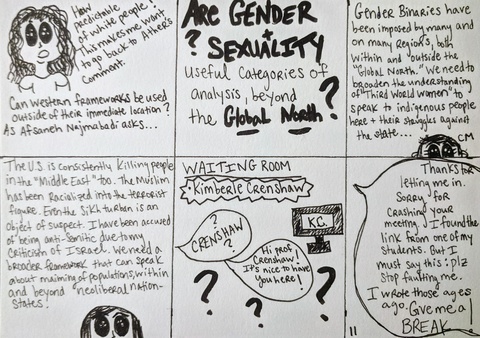
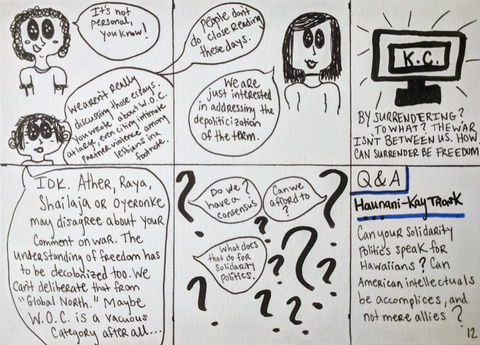
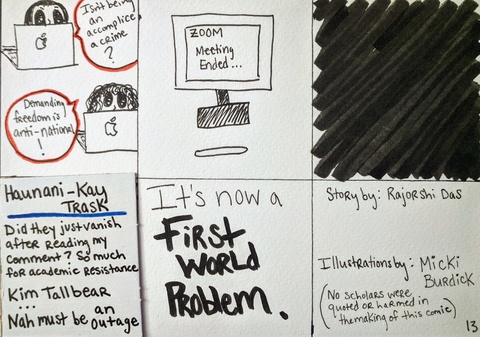
Alternative Text/Original Script Adapted...
[Amina Mirza (AM) starts the meeting. Bree Taylor (BT) joins the room. Both AM and BT are graduate students in an American university. AM makes Bree the co-host. BT switches off the video, and shares her screen, displaying a “MY FEMINISM WILL BE INTERSECTIONAL OR IT WILL BE BULLSHIT!” placard]
AM: Bree, you there?
BT: No. I am not. We still have five minutes to go.
(AM rolls her eyes.)
BT: I can see you doing that.
AM: O-kay, Miss Foucault.
BT: You are being sexist.
AM (rolls her eyes again): Can we compare the notes before they arrive?
BT: What is there to compare? We are gonna be rad. By the way, what do you make of my placard?
AM: You haven’t cited it.
BT: What?
AM: It’s by Flavia Dzodan.
BT: I picked it up from Maria’s profile.
AM: Bree!
BT: What? I know intersectionality was coined by (thinks) Crenshaw.
AM: Are you sure it wasn’t coined by a Maria’s Insta page?
BT: Why are you such a sucker for names? Not that you are good at sucking in particular [Jennifer Nash has entered the waiting room] She’s early. Are you sure we must begin with her book?
AM: Yes, it’s a great intervention in intersectionality studies.
BT: Yes, “letting go” of intersectionality is the best intervention in intersectionality studies. Bonus points for logic.
AM: That’s a misreading. Besides, you are a white woman; you don’t get to decide.
BT: Thanks for not doing an Adichie on me, but I prefer being identified as a white transwoman.
AM: Okay, that’s one Black feminist I don’t quite like. Not that this changes anything. White ass privilege is real.
BT: Peace! [JN is allowed into the main room.]
AM: Welcome Professor Nash. How are you doing?
JN: I am good, Amina. It’s so weird to keep doing these conversations on Zoom.
AM: Yes. It’s my third meeting of the day. (Cherríe Moraga has entered the waiting room) Cherríe Moraga is here too! [CM is allowed into the main room] Welcome Professor Moraga.
CM: Hope I am not late.
JN: You are good, Cherríe. I just joined the meeting.
BM: Should we get started? We are going to stream this live on Facebook, and take some questions.
JN: Sure, Bree. I would love to hear what young people have to say.
AM: I am sure older people use Facebook too.
CM: I don’t have much patience with either old hags or Facebook wokeness.
BT: We can erase them.
JN: What?
AM: I think she means erasing comments, right?
[BT giggles awkwardly. Begins live streaming.]
AM: Hi Everyone. Welcome to our roundtable on intersectionality. We hope to have a spontaneous discussion on the topic. We have Professor Jennifer Nash and Professor Cherríe Moraga with us, and we will soon be joined by Professor Jasbir Puar. Viewers can drop their questions as “comments," and we would love to address some of them later. Professor Nash, your new book, Black Feminism Reimagined was published last year. Can you tell us a bit about this reimagining? For instance, what do you mean by “letting go” of intersectionality, which as we all understand is often associated with Kimberlé Crenshaw’s scholarship?
JN: I made that suggestion as a way to do away with “proprietary impulses” so that we don’t stick to notions of fidelity and origins. For instance, I think intersectionality often gets restricted to being about Black women only. We are not the only ones doing the heavy lifting.
AM: But Crenshaw’s 1991 essay wasn’t just about Black women.
JN: Yeah, but the traffic intersection model in her previous essay was about a kind of specificity, right? How many fingers can that one hole accommodate?
BT: Fingers? I'm in favor of safe monogamy only.
AM: You are a boring capitalist.
AM: You mean women of color?
JN: Yeah. Yeah. We should not restrict intersectionality to a few carefully crafted gatekeepers. For instance, why isn’t This Bridge Called My Back seen as one of the origins?
AM: But it has been canonized too. Do you want to come in, Professor Moraga?
[Jasbir Puar is in the waiting room. JP is allowed into main room.]
CM: Well, I don’t think origin points or even canons are so important, as long as we are mindful of genealogies. The Bridge, as a possibility allowed us to have conversations about and among women of color. We had bigger holes! (Laughs)
AM: I can certainly imagine the labor. Welcome, Professor Puar. We were just discussing how intersectionality has been read, in terms of specificities and origins.
JP: Hi Amina. Please call me Jasbir. Hi everyone. Sorry, for being a bit late.
BT: You are good. Besides, you look gorgeous.
AM: Stop it.
BT: What?
AM: You know what.
BT: You jealous? We can try an orgy later.
AM: Lol. You can't even eat my kitten.
JP: Thank you, Bree.
AM: Professor Moraga, can you expand a bit on the framework of the “bridge” as a model?
CM: Sure. Our book was an attempt to have women from different races and ethnicities
think about co-existence and change. It helped us grow and challenge the binary between
academia and activism. I think we also questioned the supremacy of English language and white feminism.
BT: Can the bridge, as a theoretical tool speak to the experiences of transwomen?
CM: Why not? However, I do think that trans and non-binary people of color, at large continue to be under-represented in publishing and canon-making.
BT: Why does she have to specify "color?"
AM: Stop being racist.
AM: Was intersectionality already a buzzword in the 80s?
CM: I don’t recall, but the Combahee River Collective statement was part of our anthology. As long as women of color can work toward a decolonial approach, solidarities are possible. As Gloria used to say, we must embrace the mestizaje heritage of Chicana feminists.
Ramon Grosfoguel commented: Decolonial International Networks are the only way forward.
BT: Seems like someone agrees with you. (CM gives a “who is this bitch?” look)
JP: Can I jump in here?
AM: Sure.
JP: I think we need to be wary of WOC as an identity category. It doesn’t take into account our complexities and hierarchies, with regard to religion.
CM: I didn’t imply that it is an identity. My foreword to the post 9/11 version of the book addresses the problems of producing knowledge in “Global North” about “Third-World Women.”
Ather Zia commented: We must address the colonial projects within "Global South," such as Indian occupation of Kashmir, and the tendency of "Western" feminist frameworks to recolonize our bodies.
AM: I hope everyone can see Ather Zia’s comment. Jasbir, do you think that “assemblage” can have a decolonial approach?
JP: Assemblage theory can certainly explain the transnational and the neoliberal framing of rights. I don’t know if “we” can do it together, but I find assemblage useful to articulate the pinkwashing of Israel’s occupation of Palestine. I don’t think an identitarian approach of intersectionality is quite capable of doing that.
BT: Doesn't that sound like a battle?
AM: I can see Moraga fuming.
CM: But aren’t most of the Black feminist texts of the 80s and the 90s speaking to intra-community differences, and hence being critical of identity politics?
JN: If I may butt in, I think the post-Crenshaw intersectional project has been caught somewhere between challenging the oppressive minority cultures, and grappling with anxieties around the non-identitarian tendencies of postmodernism.
JP: I agree. That’s why I find Donna Haraway’s cyborg manifesto quite fascinating.
CM: Which other white authors, apart from Deleuze, Guattari or Foucault, do you find fascinating?
JP: Excuse me? Are you implying that I am a race-traitor?
Judith Butler commented: I think Cherrie means that I have been inspiring you, Jasbir.
CM: I can speak for myself, Butt-liar. Besides, unlike her, you only cite your own race in Gender Trouble.
BT: To be fair, she cited Spivak too.
CM: Yes, the token brown friend. Not unlike your token white body here.
(Awkward Silence)
AM: (nervous laughter) Hahaha. I suppose that’s why Professor Nash has a chapter on intersectionality wars.
JN: Fair point, Amina. I find Jasbir’s scholarship important to expand on the framework of intersectionality.
JP: Thanks Jennifer. Some white authors aren’t really bland.
JN: You don’t have to defend. I think Nivedita Menon also has a fair critique of intersectionality, and she does not even engage with white authors.
Raya Sarker: LOL. Not citing white authors, but sustaining Brahmin caste hegemony, nonetheless. Besides, Menon described us as "fingertip feminists" for calling out her patronizing attitude to Dalit women and sexual assault survivors.
Mary John: Hi Global North feminists! Please read my critique of Menon's critique.
BT: Dalit?
CM: Dalits are oppressed groups of people who were historically enslaved by upper caste Hindus in India. Looks like Menon was merely speaking for upper caste Hindu women.
Chandra Talpade Mohanty commented: Can transnational feminism add to intersectionality?
Shailaja Paik replied: @Mohanty certainly can, if upper caste WOC like you don't guard the gates forever.
BT: A lot is going on there! I am not able to grasp everything.
AM: How predictable of white people! This makes me want to go back to Ather’s comment. Can “Western” frameworks be useful, outside their immediate location? As Afsaneh Najmabadi asks, are gender and sexuality useful categories of analysis, beyond the “Global North”?
Oyeronke Ovewumi commented: Gender stratification in Yoruba community is a modern import. It's a historical, rather than a social construct.
CM: Yes, Oyeronke, gender binaries have certainly been imposed on many regions, both within and outside of “Global North.” We need to broaden the understanding of “Third-World Woman” to speak to indigenous people here and their struggles against the US state.
JP: I agree. The US is consistently killing people in the “Middle East” too. The Muslim has been racialized into the terrorist figure. Even the Sikh turban is an object of suspect. I have been accused of being anti-Semitic due to my criticism of Israel. We certainly need a broader framework that can speak about maiming of populations, within and beyond neoliberal nation-states.
(Kimberle Crenshaw has entered the waiting room.)
BT: Crenshaw?
(Everybody looks confused. Crenshaw enters the main room.)
BT: Hi Professor Crenshaw. It’s nice to have you there.
KC: Sorry, for crashing your meeting. I found the link from one of my students. Of course, I wasn’t invited. But I must say this: please stop faulting me. I wrote those essays ages ago. Give me a break!
JN: It’s not personal, you know.
CM: We aren’t really discussing those essays. Besides, you wrote about women of color at large, even citing intimate partner violence among lesbians, in a footnote. People don’t do close reading these days.
JP: We are just interested in addressing the depoliticization of the term.
KC: By surrendering? And surrendering to what? The war isn’t between us. How can surrender be a path towards freedom?
CM: I don’t know. Ather, Raya, Shailaja or Oyeronke may disagree about your comment on war. The understanding of freedom has to be decolonized too. We can’t deliberate on that from “Global North.” Maybe, WOC is a vacuous category, after all.
JP: Do we have a consensus there?
JN: Can we afford to? What does consensus do for solidarity politics?
Haunani-Kay Trask: Can your solidarity politics speak for Hawaiians? Can American intellectuals be accomplices, and not mere allies?
BT: Isn't being an accomplice a crime?
AM: Demanding freedom is anti-national.
[Zoom hangs up. The meeting abruptly ends.]
Haunani-Kay Trask: Did they just vanish after reading my comment? So much for academic resistance!
Kim Tallbear: Nah. Must be the outage. It's now a First World problem.
